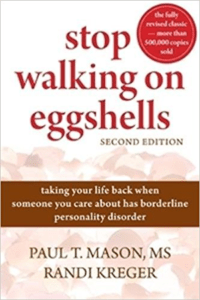
Excerpt from Stop Walking on Eggshells
Do you find yourself concealing what you think or feel because you’re afraid of the other person’s reaction or because it just doesn’t seem worth the horrible fight or hurt feelings that will follow?
Do you feel that anything you say or do will be twisted and used against you? Are you blamed and criticized for everything wrong in the relationship— even when it makes no logical sense?
Are you the focus of intense, violent, or irrational rages, alternating with perfectly normal and loving behavior? Does no one believe you when you explain that this is going on?
Do you feel like the person you care about sees you as either all good or all bad, with nothing in between? Is there sometimes no rational reason for the switch?
Are you afraid to ask for things in the relationship because you will be told that you’re too demanding or that there is something wrong with you? Do you feel that your needs are not important?
Does the other person denigrate or deny your point of view? Do you feel that their expectations are constantly changing, so you can never do anything right?
Are you accused of doing things you never did and saying things you never said? Do you feel misunderstood and, when you try to explain, do you find that the other person doesn’t believe you?
Are you often put down? If you try to leave the relationship, does the other person try to prevent you, using anything from declarations of love and promises to change to implicit or explicit threats? Do you make excuses for their behavior or try to convince yourself that everything is okay?
Do you feel manipulated, controlled, or even lied to sometimes? Do you feel like you’re the victim of emotional blackmail?
Excerpt from Stop Walking on Eggshells: Taking Your Life Back When Someone You Care About Has Borderline Personality Disorder
If you answered yes to many of these questions, we have good news for you:
- You’re not going crazy.
- It’s not your fault.
- And you’re not alone.
You may share these experiences because someone close to you has traits associated with borderline personality disorder (BPD).
NOTE: Both men and women can exhibit traits of Borderline Personality Disorder.
* As an Amazon Associate I earn from qualifying purchases.

